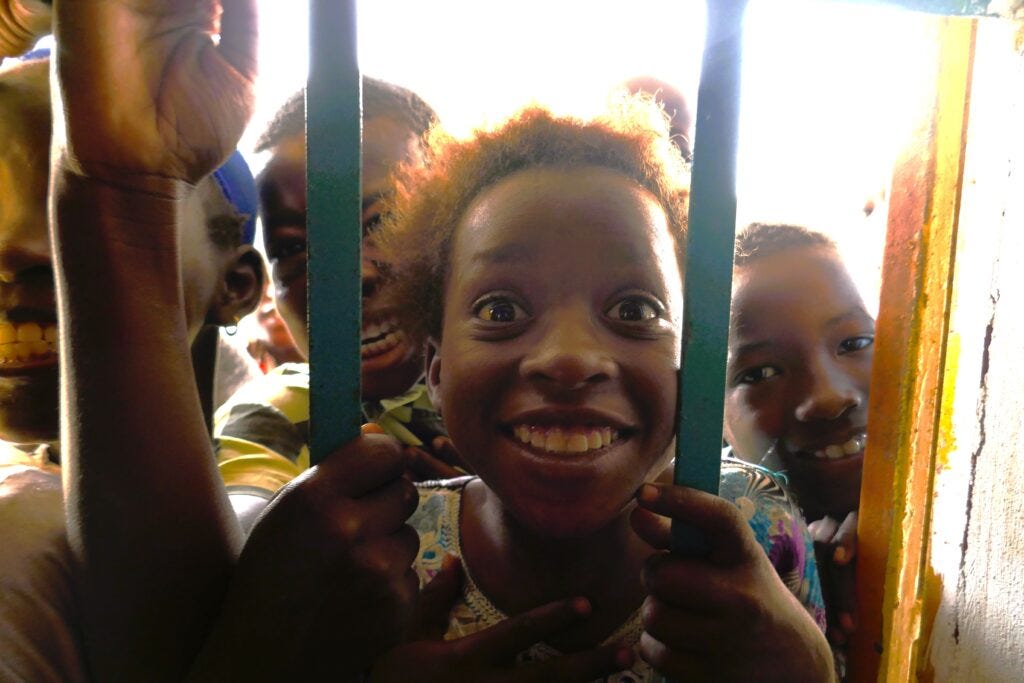About Poverty
Poverty in Africa is not what you think
I often hear the main problem in Africa is poverty. After my short (and definitely incomplete) visit in the Gambia, one of the poorest nations on the planet, I disagree.
In the Gambia, typical earnings are around Eur 80/month (some online sources estimate Eur 400 – I think they are simply wrong). But this number means nothing, because the poverty is not what we, Westerners, think. It is a state of mind difficult to define, that could be described as: “the choice to accept the life today“. This is why what greets you everywhere in Gambia is a smile. More than that! A deep, healthy laugh, coming from the depth of a soul.
Let’s move on with some examples.
Transport? In Gambia, no one rides a bike. Instead, cars and traffic jam is everywhere. Far in the upper Gambia provinces, I also saw donkey carts. But even there, bicycles are unseen. Rather than buying a good bike, a person would sell twenty donkeys to buy an old, decaying car. It is an economic absurd, because of prohibitive cost of maintenance of an old car, bad roads, and low technical culture. Cars here break all the time, and the repairs are rarely successful. Yet – riding my bike from my Wullinkama home to the Turntable market to buy tomatoes, I am alone among cars.
Shoes? No one walks barefoot. I do. Sometimes before noon, when the sand is not too hot, I walk barefoot a few meters to the nearest store. People are shocked and children point fingers at me. “where your shoe?” (Note: don’t walk barefoot in Africa in areas you don’t know - especially areas where pigs are raised are known to be infected by jigger, a parasite that enters your foot and lays eggs under your skin.)
Food? No one is hungry and no one is homeless. I am told this is due to strong social responsibility of the Gambians, who care even after distant family members. However, this also means that those who are employed, often maintain many unemployed relatives in their households. But there are no homeless kids and very few professional beggars on the street.
Small luxuries? People who earn, generally do not save due to uncontrolled small expenditures. My friend who earns money as guide, smokes one pack of bad cigarettes per day, so he spends 2,000 dalasis per months for tobacco (note that many people earn 4,000 per month). All local shops are full of luxury imported drinks: fanta, coca-cola, beer, and bottled water, while the local alternatives (baobab juice, wonjo, ginger juice and filtered water) are not only healthier, but also much cheaper. Sugar is everywhere, added to drinks in huge quantities.
Negligence starts with small things. Shoppers never reuse bags. They get a new plastic bag every day. After drinking a beer on the street, one throws the empty bottle behind themselves. People carry money in pockets, and they exchange it in the form of a crumpled ball of half-torn papers as if it was a donut wrapped in paper. But there is no donut inside, just a bunch of dirty banknotes.
People often don’t work if they don’t have to. The local hairdresser tells me her working week ends Wednesday. “From Thursday to Sunday I rest”, she says. My taxi driver often says: “call me next week, my car is being repaired”. People don’t actively search employment, and once employed, quickly quit for being too tired or bored. Both expats and local business owners confirm that finding labor is difficult.
Almost everyone owns a mobile telephone. I visited a family where a divorced woman was taking care of her two kids. I was asked to provide financial support: the 12-year-old was the last one in class without a smartphone.
Admittedly, I am not expert on Africa. But based what I have seen in the Gambia, I feel that the European concept of poverty in so-called “third world” is a misunderstanding. A good analysis on this can be found in Factfulness by Hans Rosling (2018), explaining how our, European ideas about the world are outdated – often dating back to 19th century.
With all this, people in Gambia are happy, smiling, and celebrating every day with good energy and a good portion of laugh. Maybe we could teach them about the economy or treatment of garbage. But maybe we have also much to learn.
Note: the numbers I quote were noted in mid-2024. Due to high inflation, they may be different now.



